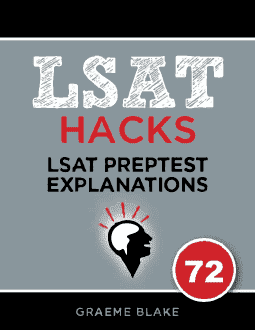DISCUSSION: The right answer will actually be in the passage. You should try to find a line reference.
Most of the wrong answers sound tempting because they use words from the passage, but in reality they actually contradict the passage.
___________
- Not quite. Theoretical equipoise may only be one ethical requirement for doing a study. There could be many other factors that can make a study unethical.
- This is true in the real world, but the passage never mentions it. You’re not looking for something you may recognize from outside knowledge. You’re looking for something the passage says.
- CORRECT. Lines 50-56 say this directly. You can participate ethically in a study while believing one of the two treatments is better.
- The whole point of the passage is that theoretical equipoise is much more strict than clinical equipoise! If you picked this, you either misunderstood the answer or you need to reread the passage.
- This is unlikely. The author has just invented the idea of clinical equipoise. It doesn’t exist yet! See lines 34-36. (“A new notion should be developed….”)


Isn’t B proven by lines 29-32, where “even fewer could proceed to completion”, meaning that they’re suspended prematurely?
You need to read the whole sentence. IF theoretical equipoise were adhered to, THEN fewer could proceed to completion.
But the passage implies theoretical equipoise is not strictly adhered to.
The passage implies theoretical equipoise is usually adhered to in Line 16: “… the conception of equipoise that is typically employed- which I will term ‘theoretical equipoise’- may be too strict”.
B is supported since most of the time theoretical equipoise is adhered to and if it is adhered to–> few clinical trials could commence and even fewer could proceed to completion. So, it seems as though currently, yes, clinical researchers are often forced to suspend clinical trials prematurely.
To me, C reads as if its referring to the way theoretical standards are currently employed, not how they should be employed. It seems as though since theoretical equipoise is based on ethical standards and most clinical trials adhere to this form of equipoise and the tenets of this equipoise are against physicians coming to favor one treatment over the other during a clinical trial, then I would disagree with C.
If this question asked for the author’s opinion, I would have chosen C over B.
C’s wording of “is not rendered” seems to point to how the practice is done now.
I am having a hard time justifying C over B as the answer
I’ll reiterate my earlier comment: all of paragraph 2 is hypothetical. To employ a conception of equipoise means the definition you employ. But that doesn’t necessarily mean your actions follow your ideals. Equipoise is the theory we use but the author doesn’t say that factually we actually do use this theory in practice and halt clinical trials.
This is a very subtle point but it’s crucial to notice when an author switches from factual to hypothetical. This author only speaks factually that one time, about which theory is in use. But they the rest of the paragraph is hypothetical. It’s as if you define yourself as an athletic person, but don’t actually exercise in practice.
The LSAT tends to stick to reality, and in reality clinical trials do happen regularly.
Note: This is an old comment but I wanted to clarify the point.